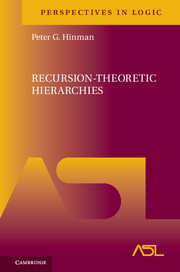Author's Preface
Published online by Cambridge University Press: 31 March 2017
Summary
At a recent meeting of logicians, one speaker complained — mainly, but perhaps not wholly, in jest — that logic is tightly controlled by a small group of people (the cabal) who exercise careful control over the release of new ideas to the general public (especially students) and indeed suppress some material completely. The situation is surely not so grim as this, but any potential reader of this book must have felt at some time that there is at least a minor conspiracy to keep new ideas inaccessible until the “insiders” have worked them over thoroughly. In particular he might well feel this way about the whole subject of Generalized Recursion Theory, which developed in the second half of the 1960s. The basic definitions and results on recursion involving functionals of higher type appeared in the monumental but extremely difficult paper Kleene [1959] and [1963]. Gandy [1967] gave another presentation ab initio, but the planned part II of this paper, as well as several other major advances in the subject, never appeared in print. For the theory of recursion on ordinals, the situation was even worse. Much of the basic material had appeared only in the abstracts Kripke [1964, 1964a], and although certain parts of the theory had been worked out in papers such as Kreisel-Sacks [1965] and Sacks [1967], there was no reasonably complete account of the basic facts of the subject in print.
When I first contemplated doing something about this situation in the spring of 1971, I planned to write a short monograph on recursion relative to type-2 functionals with enough background on ordinary Recursion Theory to show how the theories fit together. Before I had done much about it, however, the invitation of the ft-Group to write a volume for this series stimulated me to think in more ambitious terms and my plan expanded gradually to include functionals of types 3 and higher, ordinal recursion, and a more thorough presentation of the material on definability (Chapters III-V). The constant encouragement of the ft-Group, collective and individual, was essential to the completion of the task.
- Type
- Chapter
- Information
- Recursion-Theoretic Hierarchies , pp. ix - xPublisher: Cambridge University PressPrint publication year: 2017



